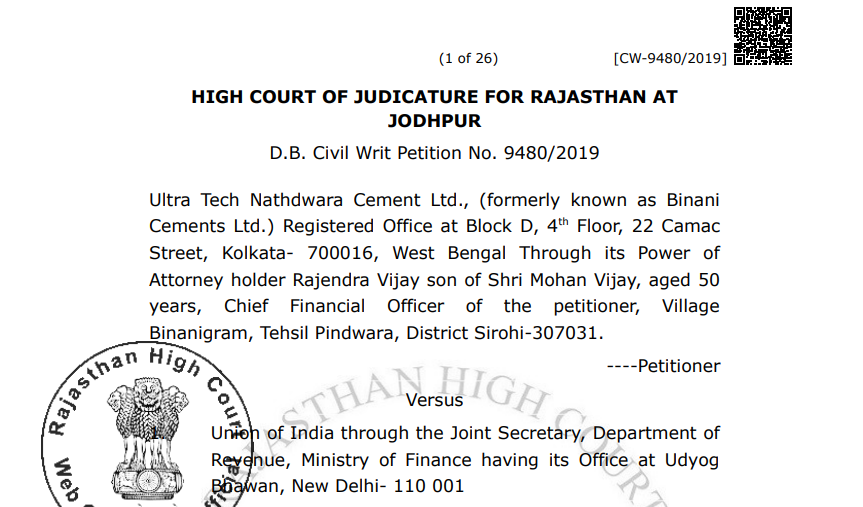Rajasthan High Court quashed the notice against Ultratech cement
Table of Contents
Introduction:
In concluding remarks Court said
“We are of the firm view that the authorities should have adopted a pragmatic GB approach and immediately withdrawn the demands rather than indulging in totally frivolous litigation, thereby unnecessarily adding to the overflowing dockets of cases in the courts”.
Interesting case law in favor of the assessee
Case Covered:
Ultra Tech Nathdwara Cement Ltd.
Versus
Union of India
Read the full text of the case here.
Facts of the case:
Brief facts relevant and essential for disposal of the case are that a company named Binani Cement suffered huge losses and was unable to pay the debts to the Financial Creditor i.e. Bank of Baroda, which preferred an insolvency application being Company Petition (IB) No.359/KB/2017 under Section 7 of the Insolvency Bankruptcy Code 2016 before the National Company Law Tribunal, Kolkata Bench (hereinafter referred to as ‘NCLT’ for brevity). A Corporate Insolvency Resolution Process (hereinafter to be referred to as ‘CIRP’ for brevity) was initiated by the NCLT under the provisions of the IBC 2016. Shri Vijay Kumar V. Iyer was appointed as the Insolvency Resolution Professional and his appointment was affirmed by the Committee of Creditors (hereinafter to be referred to as ‘COC’ for brevity) constituted under the provisions of IBC vide its meeting dated 22.8.2017. Acting under the provisions of the IBC, the Resolution Professional invited prospective resolution applicants to stake a bid for the company facing insolvency proceedings. The petitioner company was one of the resolution applicants in the Corporate Insolvency Resolution Process. After reviewing and comparing the resolution plans received, the COC came to the conclusion that the resolution plan of the petitioner company Ultra Tech was the best one equipped to achieve the purpose of the IBC i.e. the maximization of the value of the assets. In the meeting of the COC held on 28.5.2018, the resolution plan submitted by Ultra Tech was approved unanimously and it was declared to be the successful resolution applicant. The resolution plan dealt with the dues of all the creditors equitably and was superior in terms of recovery to the banks and other creditors as compared to the losses which all the creditors would have suffered in case the company had gone into liquidation.
Observations of the court:
We have given our thoughtful consideration to the arguments advanced at the bar and have gone through the material available on record and the impugned notices.
It cannot be gainsaid that the controversy at hand hours around the simple issue as to whether the resolution plan approved by the COC is binding on the department or not. In this regard, it is trite to note that as per the amended Section 31 of the IBC referred to supra, the Central Govt., State Govt. or any other local authority to whom, a debt in respect of payment of dues arising under any law for the time being in force are owed, have been brought under the umbrella of the resolution plan approved by the adjudicating officer which has been made binding on such governments and local authorities. The purpose of the IBC is salutary as it has been enacted to ensure that an industry under distress does not fade into oblivion and can be revived by virtue of the resolution plan. Once the offer of the resolution applicant is accepted and the resolution plan is approved by the appropriate authority, the same is binding on all concerned to whom the industry concern may be having statutory dues. No right of audience is given in the resolution proceedings to the operational creditors viz. the Central Govt. or the State Govt. as the case may be.
Judgement of the court:
Therefore, we are of the firm opinion that the respondents would be acting in a totally illegal and arbitrary manner while pressing for demands raised vide the notices which are impugned in this writ petition and any other demands which they may contemplate for the period prior to the resolution plan being finalized.
The demand notices are ex-facie illegal, arbitrary and per-se and cannot be sustained.
Accordingly, the impugned demand notices and orders viz. notice dated 11.2.2019 (Annex.10), letter dated 7.9.2018 (Annex.11), order dated 20.3.2019 (Annex.12), notice dated 6.3.2019 (Annex.13), notice dated 8.3.2019 (Annex.14), notice dated 29.3.2019 (Annex.15), notice dated 29.3.2019 (Annex.16), notice dated 10.4.2019 (Annex.18), order dated 9.4.2019 (Annex.19), two notices dated 11.6.2019 (Annex.20) and any further demands pending as on the date of finalization of the resolution plan issued/raised by the respondents Central Goods and Service Tax Department, Govt. of India are quashed and struck down.
Before parting, we would like to express our serious reservation on the approach of the concerned Officers of the GST in persisting with the demands raised from the petitioner in gross ignorance of the pertinent statement made by Hon’ble the Finance Minister before the Parliament (referred to supra) and the amendment brought around in the IBC. We are of the firm view that the authorities should have adopted a pragmatic approach and immediately withdrawn the demands rather than indulging in a totally frivolous litigation, thereby unnecessarily adding to the overflowing dockets of cases in the courts.
The writ petition is allowed accordingly.
No order as to costs.
Download the copy:









